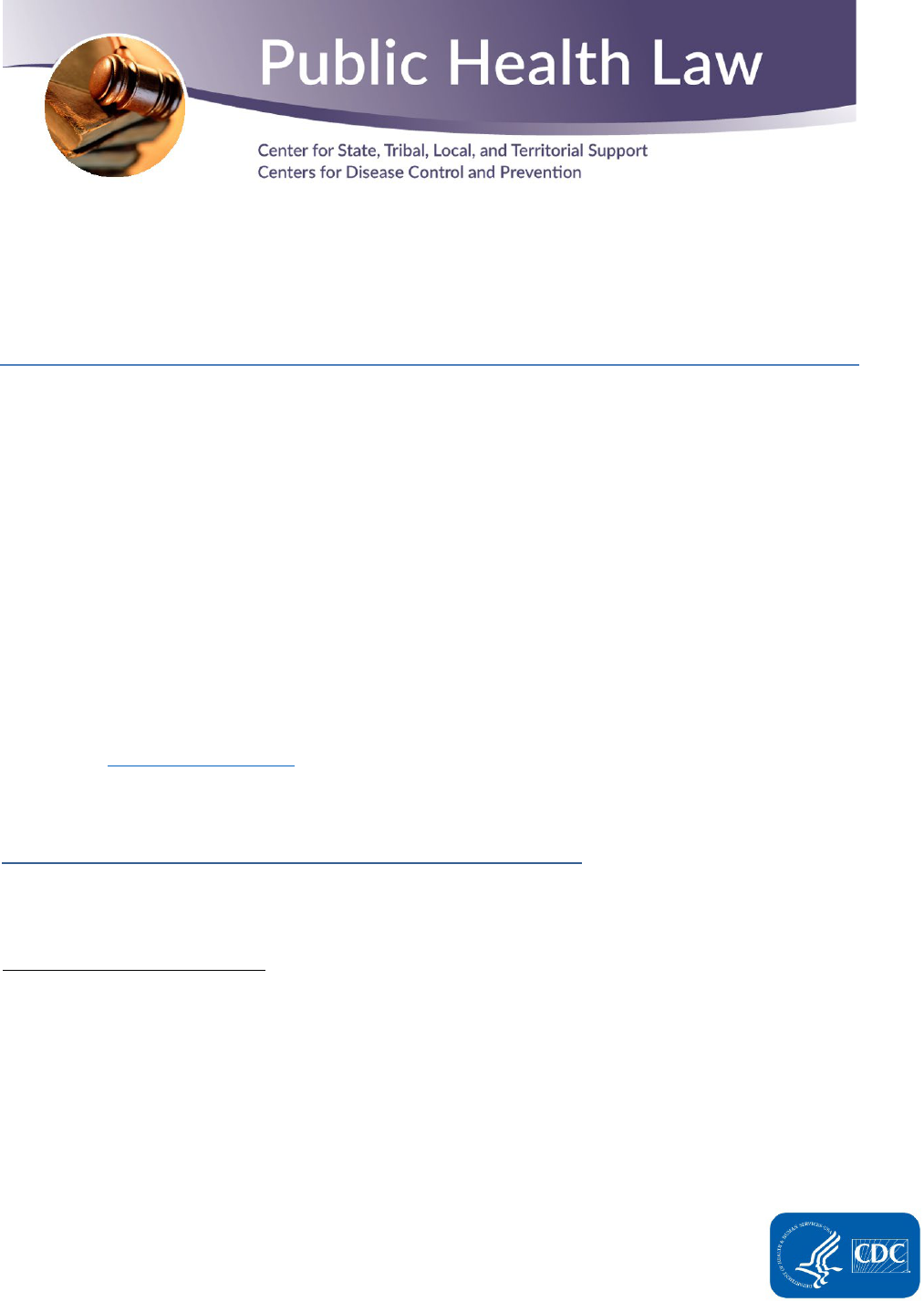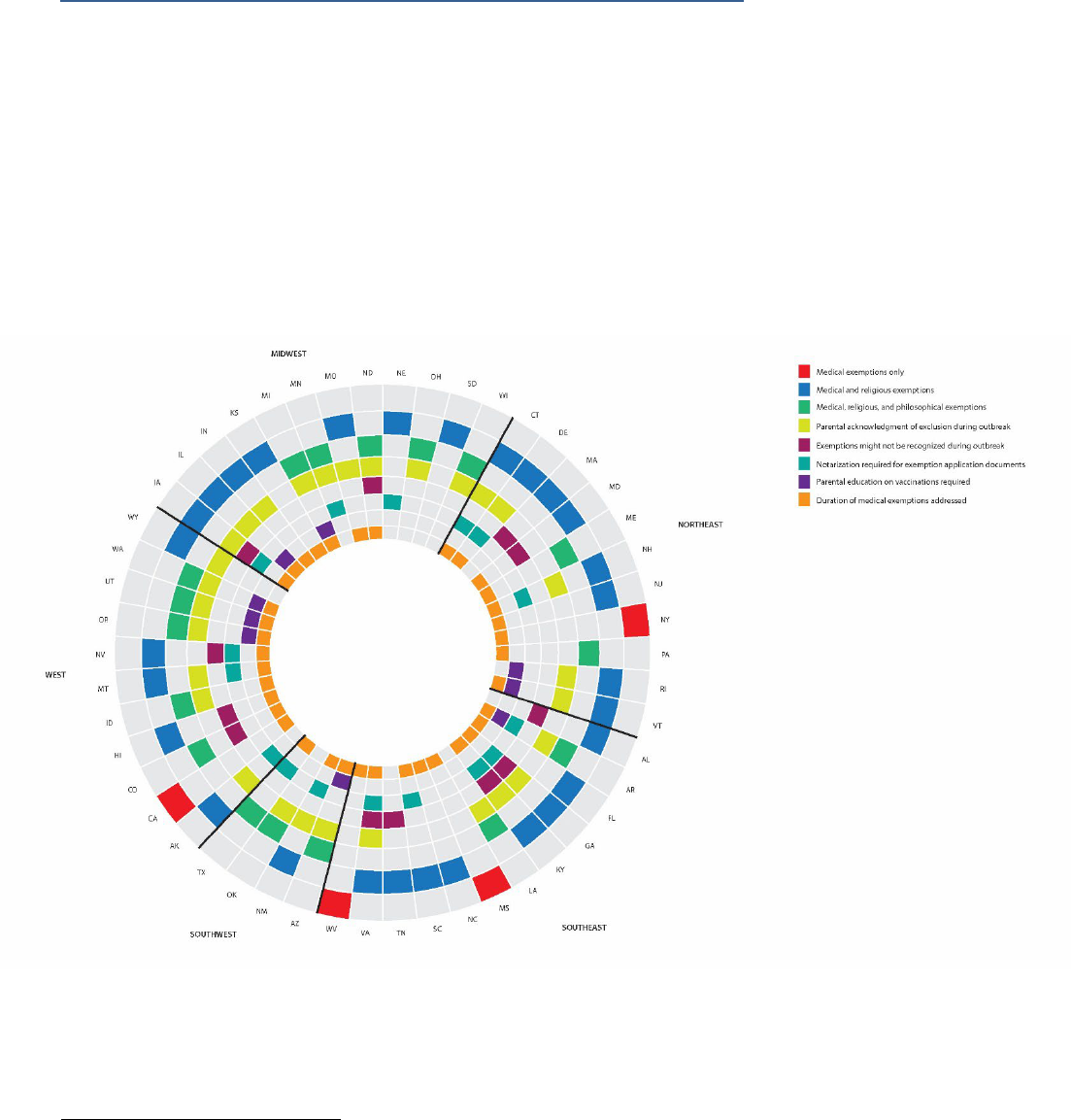
State School Immunization Requirements and
Vaccine Exemption Laws
State laws establish vaccination requirements for school children. These vaccination laws often apply not only to
children attending public schools, but also to those attending private, parochial, and other types of schools.
1
State
laws also offer exemptions to school vaccination requirements, including medical, religious, and philosophical
exemptions or some combination of these exemptions.
2
Th
e Centers for Disease Control and Prevention’s (CDC’s) Public Health Law Program (PHLP), within the Center for
State, Tribal, Local, and Territorial Support, has conducted an assessment of state statutes, regulations, and state
health department policies (collectively referred to as “laws”) regarding school vaccinations. This document is a
2019 update
3
of state vaccination laws originally collected in 2015 and updated previously in 2017. This 2019
assessment addresses vaccinations required for grades K-12; it does not include vaccinations required for
preschool children only or for higher education. Each section of the menu below provides examples of state laws
on school vaccination requirements or examples of laws about exemptions from those requirements. The
appendices provide data on laws from all fifty states collected in the 2019 assessment.
Fo
r questions related to this document or to request updates to relevant immunization laws for your state, please
email PHLP at PHLawProgram@cdc.gov
. Note that the information contained in this document was collected for
research and educational purposes. Please contact your local or state health department for school vaccination
requirements that may apply to your individual circumstances.
State Vaccination Requirements in K-12 Schools
All states require children to be vaccinated against certain communicable diseases as a condition for
school attendance.
4
Most state school vaccination laws expressly apply to both public and private
schools.
5
Homeschools are expressly covered by school vaccination requirements in several states.
6
1
See, e.g., Colo. Rev. Stat. § 25-4-901; Haw. Rev. Stat. § 302A-901; N.Y. Public Health Law § 2164; N.D. Cent. Code
§ 23-07-17.1; Tenn. Comp. R. & Regs. 1200-14-01-.29; Wash. Rev. Code Ann. § 28A.210.080.
2
See, e.g., Ala. Code § 16-30-3; Cal. Health & Safety Code § 120370; Haw. Rev. Stat. § 302A-1156; Neb. Rev. Stat. §
79-221; Ohio Rev. Code Ann. § 3313.671(B)(4), (5); W. Va. Code § 16-3-4.
3
PHLP collected statutes and regulations using a search in the legal database Westlaw on July 8-9, 2019. Policy
documents for the 2019–2020 school year were collected from state websites between January and March 2020.
4
See, e.g., Fla. Stat. § 1003.22; Nev. Rev. Stat. § 394.192; Va. Code. Ann. § 32.1-46.
5
See, e.g., Ala. Code § 160-30-4; Mich. Comp. Laws § 380.1177; N.C. Gen. Stat. § 130A-155.
6
See, e.g., Minn. Stat. § 121A.15; Tenn. Code Ann. § 49-6-3050; Va. Code Ann. § 22.1-271.4. Additional jurisdictions
may have vaccination requirements for homeschools; PHLP did not conduct a 50-state assessment on coverage of
homeschools by state school vaccination laws.
February
2022

2
Required Vaccines for Entry into Kindergarten and Later Grades
Four common childhood vaccines—DTaP, MMR, polio, and varicella—are required for children to enroll
in kindergarten in almost every state.
7
Many states require the meningococcal (meningitis) vaccine for
entry into later grades, often at 7th grade.
8
Some states require additional vaccines, either for entry into
kindergarten or for entry into later grades.
Alaska is one of several states that require hepatitis A and hepatitis B vaccines for entry into
kindergarten: “Before entry in a state public school district or nonpublic school offering pre-
elementary education through the 12th grade, or any combination of these grades, a child shall
be immunized against (1) diphtheria, tetanus, polio, pertussis, measles, mumps, hepatitis A,
hepatitis B, and rubella, except rubella is not required in children 12 years of age or older; and
(2) beginning July 1, 2009, varicella.”
9
For entry into later grades, Rhode Island requires the human papillomavirus (HPV) vaccine,
according to the following schedule: “Beginning August 1, 2015, all students entering seventh
(7th) grade shall be required to have at least one (1) dose of the HPV vaccine series. Beginning
August 1, 2016, all students entering eighth (8th) grade shall be required to have at least two
(2) doses of the HPV vaccine series. Beginning August 1, 2017, all students entering ninth (9th)
grade shall be required to have completed the HPV vaccine series (3 doses).”
10
Acceptable Proof of Immunization
State laws vary on the types of acceptable proof of immunization for enrollment in grades K-12. Among the
different types of acceptable documentation are medical records, a health department or school form, information
from the state’s Immunization Information System (IIS), or a “certificate of immunization,” which may be issued by,
for example, a state health department or a physician’s office.
11
In a few states, a parental report is allowed.
12
Kentucky requires a “current Commonwealth of Kentucky Certificate of Immunization,” which “shall be
issued by: (a) A physician licensed in any state; (b) An advanced practice registered nurse licensed in any
state; (c) A physician assistant licensed in Kentucky; (d) A pharmacist licensed in Kentucky; (e) A local health
department in Kentucky; (f) A licensed healthcare facility administering immunizations in Kentucky; or (g) An
authorized user of the Kentucky Immunization Registry.”
13
Minnesota allows for substitution of a parental report in place of other records: “A person who is enrolling
or enrolled in an elementary or secondary school . . . may substitute a statement from . . . a parent or
guardian if the person is a minor child in lieu of the statement from a physician or public clinic which
provides immunizations. If the statement is from a parent or guardian or emancipated person, the
statement must indicate the month and year of each immunization given.
14
7
See, e.g., Ark. Code R. § 005.15.23-3.0; 6 Colo. Code. Regs §1009-2; Ga. Comp. R. & Regs. 511-2-2-.02; Md. Code
Regs. 10.06.04.03. DTaP protects against diphtheria, tetanus, and pertussis (whooping cough); MMR protects
against measles, mumps, and rubella. The only state that does not require all the listed vaccines is Iowa, which
does not require a mumps vaccine. Iowa Code § 139A.8.
8
E.g., Del. Admin. Code § 804; 05-071-26 Me. Code R. § 5; 216 R.I. Code R. § 30-0503.5.
9
Alaska Admin. Code tit 4, § 06.055(a)(1).
10
216 R.I. Code R. § 30-05-3.5.
11
See, e.g., Alaska Admin. Code tit. 4, § 06.055; Ark. Admin. Code § 005.15.23-4.0; 902 Ky. Admin. Regs 2:060; S.C.
Code Ann. Regs. R. 61-8; Vt. Admin. Code § 12-5-5:9.0.
12
See, e.g., Minn. Stat. § 121A.15(Subd.4); Or. Rev. Stat. § 433.267(1)(a).
13
902 Ky. Admin. Regs 2:060.
14
Minn. Stat. § 121A.15(Subd.4).

3
See APPENDIX A, Tables A1 and A2, for state data on vaccine requirements and acceptable proof of
vaccination.
State Laws Regarding School Vaccination Exemptions
State laws also establish exemptions for school vaccination requirements, including requirements
regarding the exemption application process. The graph below and this document explore several
attributes of state laws on school vaccination exemptions. These include whether a state:
1. Permits medical exemptions only
2. Permits medical and religious exemptions
3. Permits medical, religious, and philosophical exemptions
4. Requires parental acknowledgment during the exemption application process that exempted
students can be excluded from school during outbreaks
5. Establishes that exemptions might not be recognized in the event of an outbreak
6. Requires notarization of documents in the exemption application process
7. Requires parental education on vaccinations in the exemption application process
8. Addresses the duration of medical exemptions (e.g., temporary or permanent)
Types of School Vaccination Exemptions
There are three principal types of exemptions from school vaccination requirements: medical, religious,
and philosophical
15
exemptions. All states offer medical exemptions but there is variation among the
15
Philosophical exemptions are based on personal or moral grounds, rather than strictly religious beliefs.

4
states on the types of non-medical exemptions offered. In addition, most states allow students to be
exempt from only certain vaccination requirements; often the state will require the physician or parent
to specify which vaccines are to be considered in the exemption process.
16
On occasion, a state will
prohibit non-medical exemptions from specific vaccines.
17
California allows only medical exemptions: “If the parent or guardian files with the governing
authority a written statement by a licensed physician to the effect that the physical condition of
the child is such, or medical circumstances relating to the child are such, that immunization is
not considered safe, indicating the specific nature and probable duration of the medical
condition or circumstances, including, but not limited to, family medical history, for which the
physician does not recommend immunization, that child shall be exempt from the requirements
of Chapter 1 . . . to the extent indicated by the physician’s statement.”
18
North Dakota, which allows medical and religious exemptions, requires the physician or parent
to specify the vaccines: “A child with a medical or a beliefs exemption is exempt from any one or
all of the immunization requirements. A physician must sign an exemption form indicating the
vaccines that are included in the medical exemption. A parent or guardian must sign an
exemption form stating that the child has a beliefs exemption and indicate which vaccines are
exempt because of beliefs.”
19
Washington state allows medical, religious, and philosophical exemptions, but it does not allow
philosophical exemptions for the MMR vaccine. A child will be exempt from the state’s school
vaccination requirements for philosophical reasons “upon the presentation of . . . [a] written
certification signed by any parent or legal guardian of the child or any adult in loco parentis to
the child that the signator has either a philosophical or personal objection to the immunization
of the child. A philosophical or personal objection may not be used to exempt a child from the
measles, mumps, and rubella vaccine.”
20
Parental Acknowledgement of Exclusion from School During an Outbreak
State laws often require parental acknowledgment during the exemption application process that
exempted students can be excluded from school during an outbreak or epidemic.
21
Under Arkansas law, exemption applications require parents to sign a statement of
understanding that “[a]t the discretion of the Department of Health, the unimmunized child or
individual may be removed from day care or school during an outbreak if the child or individual
is not fully vaccinated.”
22
Under Georgia law, a parent seeking a religious exemption must sign an affidavit stating, “I
understand that, notwithstanding my religious objections, my child may be excluded from
childcare facilities or schools during an epidemic or threatened epidemic of any disease
preventable by a vaccination required by the Georgia Department of Public Health, and that my
16
See, e.g., Mich. Admin. Code r. 325.176; Minn. Stat. Ann. § 121A.15(3); N.D. Admin. Code 33-06-05-01(4); S.C.
Code Ann. Regs. 61-8(11)(A); Utah Code Ann. 1953 § 53G-9-304.
17
E.g., Wash. Rev. Code § 28A.210.090.
18
Cal. Health & Safety Code § 120370.
19
N.D. Admin. Code 33-06-05-01(4).
20
Wash. Rev. Code § 28A.210.090.
21
See, e.g., Ark. Code Ann. § 6-18-702(d)(4)(C)(iv); Ga. Comp. R. & Regs. 511-2-2-.07; Ill. Admin. Code tit. 77, § 665.510.
22
Ark. Code Ann. § 6-18-702(d)(4)(C)(iv).

5
child may be required to receive a vaccination in the event that such a disease is in epidemic
stages.”
23
In Illinois, parents seeking a religious exemption must sign a Certificate of Religious Exemption
describing the objection, which “shall also reflect the parent’s or legal guardian’s understanding
of the school’s exclusion policies in the case of a vaccine-preventable disease outbreak or
exposure.”
24
Exemptions Might Not Be Recognized During an Outbreak
In some cases, state law establishes that exemptions might not be recognized during an outbreak,
epidemic, or emergency.
25
Under Hawaii law, “[i]f at any time there is, in the opinion of the department of health, danger
of an epidemic from any of the communicable diseases for which immunization is required
under sections 302A-1154 to 302A-1163, no exemption from immunization against the disease
shall be recognized.”
26
Kentucky law allows for medical and religious exemptions “[p]rovided, however, that in the
event of an epidemic in a given area, the Cabinet for Health and Family Services may, by
emergency regulation, require the immunization of all persons within the area of epidemic,
against the disease responsible for such epidemic.”
27
Under North Dakota law, “[w]hen, in the opinion of the health officer, danger of an epidemic
exists from any of the communicable diseases for which immunization is required under this
section, the exemptions from immunization against such disease may not be recognized and
children not immunized must be excluded from an institution listed in subsection 1 until, in the
opinion of the health officer, the danger of the epidemic is over.”
28
Requirement for Notarization in Exemption Application
Some states require notarization of the forms or other statements associated with the exemption
application, most often with non-medical exemptions.
29
Arkansas requires a “notarized statement requesting a religious, philosophical, or medical
exemption from the Department of Health by the parents or legal guardian of the child.”
30
Minnesota law allows for philosophical exemptions with “a notarized statement signed by the
minor child's parent or guardian . . . stating that the person has not been immunized . . . because
of the conscientiously held beliefs of the parent or guardian of the minor child."
31
Virginia law states that “[n]o certificate of immunization shall be required for the admission to
school of any student if [t]he student or his parent or guardian submits a notarized Certificate of
23
Ga. Comp. R. & Regs. 511-2-2-.07.
24
Ill. Admin. Code tit. 77, § 665.510.
25
See, e.g., Haw. Rev. Stat. § 302A-1157; Ky. Rev. Stat. § 214.036; N.D. Cent. Code § 23-07-17.1(6).
26
Haw. Rev. Stat. § 302A-1157.
27
Ky. Rev. Stat. § 214.036.
28
N. D. Cent. Code § 23-07-17.1(6).
29
See, e.g., Ark. Code Ann. § 6-18-702(d)(1)(4)(C); Minn. Stat. Ann. § 121A.15(3)(d); Va. Admin. Code § 5-110-80(A)(1).
30
Ark. Code Ann. § 6-18-702(d)(1)(4)(C); Ark. Admin. Code § 005.15.23-5.0(5.01.1).
31
Minn. Stat. Ann. § 121A.15(3)(d).

6
Religious Exemption . . . stating that the administration of immunizing agents conflicts with the
student's religious tenets or practices.”
32
Requirement That Exemption Application Process Include Parental Education
Several states require that their exemption process include an educational component that discusses the
benefits of vaccination and the risks of not being vaccinated. This requirement is more frequently
associated with religious and philosophical exemptions.
33
Arizona’s philosophical exemption application requires “a signed statement to the school
administrator stating that the parent or guardian has received information about immunizations
provided by the department of health services and understands the risks and benefits of
immunizations and the potential risks of nonimmunization.”
34
Vermont’s religious exemption application requires that an applicant “has reviewed evidence-
based educational material provided by the Department regarding immunizations, including: (i)
information about the risks of adverse reactions to immunization; (ii) information that failure to
complete the required vaccination schedule increases risk to the person and others of
contracting or carrying a vaccine-preventable infectious disease; and (iii) information that there
are persons with special health needs attending schools and child care facilities who are unable
to be vaccinated or who are at heightened risk of contracting a vaccine-preventable
communicable disease and for whom such a disease could be life-threatening.”
35
Oregon’s process for religious and philosophical exemptions must include either “(i) A signature
from a health care practitioner verifying that the health care practitioner has reviewed with the
parent information about the risks and benefits of immunization . . . or (ii) A certificate verifying
that the parent has completed a vaccine educational module.”
36
Duration of Exemptions
Many states expressly address the duration of an exemption, most often in relation to medical
exemptions. This includes, for example, whether an exemption is temporary, permanent, or, for medical
exemptions, within the physician’s discretion.
37
In Georgia, “[a] Certificate of Immunization indicating medical exemption shall be valid for one
year, and may be reissued from year to year until the physician determines that immunization
or a specific immunization may finally be accomplished without danger to the child's health.”
38
In New Mexico, medical and religious exemptions “are valid for a period not to exceed nine (9)
months and will not extend beyond the end of the school year in which the child is currently
enrolled.”
39
West Virginia law states that “[i]f a child has been granted an exemption from receiving one or
more vaccinations, the certificate of immunization must indicate the vaccine(s) for which the
32
Va. Admin. Code § 5-110-80(A)(1).
33
See, e.g., Ariz. Rev. Stat. Ann. § 15-873; Or. Rev. Stat. § 433.267(1)(c); Or. Admin. R. 333-050-0040(1)(d); Utah Code Ann. 1953
§ 53G-9-304; Vt. Stat. Ann. 18 § 1122(a)(3); Wash. Rev. Code § 28A.210.090(2)(a).
34
Ariz. Rev. Stat. Ann. § 15-873.
35
Vt. Stat. Ann. 18 § 1122(a)(3).
36
Or. Rev. Stat. § 433.267(1)(c); Or. Admin. R. 333-050-0040(1)(d).
37
See, e.g., Conn. Agencies Regs. § 10-204a-3a; Ga Comp. R. & Regs. 511-2-2-.05; Kan. Stat. Ann. § 72-6262(b)(1); Mont. Admin.
R. 37.114.715; N.M. Stat. Ann. § 24-5-3(B); W. Va. Code R. § 64-95-14.
38
Ga Comp. R. & Regs. 511-2-2-.05.
39
N.M. Stat. Ann. § 24-5-3(B).

7
child is exempted, the reason for the exemption, and whether or not the reason for the
exemption is permanent or temporary.”
40
See APPENDIX B, Tables B1 and B2, for state data on exemptions. State data on additional variables
examined in the 2019 assessment but not discussed above can be found in APPENDIX C.
41
Citations to
state statutes and regulations relied on for Tables A, B, and C are presented in APPENDIX D.
Acknowledgments and Disclaimers
Those who developed and contributed to this 2019 assessment of school vaccination laws include
Russell McCord, JD; Mara Howard Williams, JD, MPH; Lisa Landsman, JD, MPH; Jada Fehn, JD, DRT
Strategies; and Dana Lohrberg, JD, DRT Strategies—with the assistance of Matthew Penn, JD, MLIS,
Director, Public Health Law Program (PHLP), within the Centers for Disease Control and Prevention’s
Center for State, Tribal, Local, and Territorial Support.
The original 2015 menu and 2017 update of school vaccination laws were developed by Aila Hoss, JD,
Carter Consulting, Inc.; Alexandra Bhatti, JD, MPH, Chenega Professional and Technical Services LLC;
Cason Schmit, JD, Texas A&M University School of Public Health; and Matthew Penn, JD, MLIS, Director,
Public Health Law Program. This project was originally developed in collaboration with staff from the
National Center for Immunization and Respiratory Diseases.
PHLP provides technical assistance and public health law resources to advance the use of law as a public
health tool. PHLP cannot provide legal advice on any issue and cannot represent any individual or entity
in any matter. PHLP recommends seeking the advice of an attorney or other qualified professional with
questions regarding the application of law to a specific circumstance. The findings and conclusions in this
summary are those of the authors and do not necessarily represent the official views of CDC.
40
W. Va. Code R. § 64-95-14(14.2).
41
The 2019 update asked some additional questions about state school immunization requirements not
summarized in this document. Among these are: (1) Is a specific form required for an exemption; (2) Is a
parental signature required for an exemption; (3) Does the exemption require a medical practitioner’s
signature; (4) Does the exemption require additional documentation other than a standard form or
statement from a parent; (5) Does the exemption require governmental approval to be valid; and (6) For
medical exemptions only, does the state require a provider to specify a condition or other medical
reason that prevents the student from being vaccinated.

8
Appendix A: Table A1 Vaccines Required for Entry into Kindergarten and Later Grades (K-12) (2019)
State
Which of the following vaccines are required for children to enroll in
kindergarten?
Which of the following vaccines are
required for the first time for children to
enter grades other than kindergarten?
DTaP
(Diphtheria,
Tetanus,
Pertussis)
MMR
(Measles,
Mumps,
Rubella)
Polio
Varicella
Hep A
Hep B
Other
Meningitis
HPV
Other
Alabama
X
X
X
X
Alaska
X
X
X
X
X
X
Arizona
X
X
X
X
X
X
Arkansas
X
X
X
X
X
X
X
California
X
X
X
X
X
Colorado
X
X
X
X
X
Connecticut
X
X
X
X
X
X
X
Delaware
X
X
X
X
X
X
Florida
X
X
X
X
X
Georgia
X
X
X
X
X
X
X
Hawaii
X
X
X
X
X
X
X
X
Idaho
X
X
X
X
X
X
X
Illinois
X
X
X
X
X
X
i
Indiana
X
X
X
X
X
X
X
Iowa
X
X
ii
X
X
X
X
Kansas
X
X
X
X
X
X
X
Kentucky
X
X
X
X
X
X
X
Louisiana
X
X
X
X
X
Maine
X
X
X
X
X
Maryland
X
X
X
X
X
X
Massachusetts
X
X
X
X
X
Michigan
X
X
X
X
X
X
Minnesota
X
X
X
X
X
X
Mississippi
X
X
X
X
X
Missouri
X
X
X
X
X
X
Montana
X
X
X
X
Nebraska
X
X
X
X
X
Nevada
X
X
X
X
X
X
X
New Hampshire
X
X
X
X
X
New Jersey
X
X
X
X
X
X
New Mexico
X
X
X
X
X
New York
X
X
X
X
X
X
North Carolina
X
X
X
X
X
X
iii
X
North Dakota
X
X
X
X
X
X
Ohio
X
X
X
X
X
X
Oklahoma
X
X
X
X
X
X
Oregon
X
X
X
X
X
X
Pennsylvania
X
X
X
X
X
X
Rhode Island
X
X
X
X
X
X
X
South Carolina
X
X
X
X
X
X
South Dakota
X
X
X
X
X
Tennessee
X
X
X
X
X
X
Texas
X
X
X
X
X
X
X
Utah
X
X
X
X
X
X
X
Vermont
X
X
X
X
X
Virginia
X
X
X
X
X
X
Washington
X
X
X
X
X
West Virginia
X
X
X
X
X
X
Wisconsin
X
X
X
X
X
Wyoming
X
X
X
X
X
Legend: “X” = yes; blank = no or not specified

9
Appendix A: Table A2 Acceptable Proof of Vaccination (2019)
State
Which of the following are accepted by the state as proof of immunization?
Immunization
Information
System (IIS)
Provider medical
records or
printout
Health
department or
school form or
record
Parental
report
Certificate of
Immunization
Other
Not
specified
Alabama
X
X
Alaska
X
X
Arizona
X
X
X
Arkansas
X
X
X
California
X
X
X
Colorado
X
X
X
X
Connecticut
X
Delaware
X
Florida
X
X
X
X
Georgia
X
X
X
X
Hawaii
X
X
Idaho
X
X
X
Illinois
X
Indiana
X
X
X
Iowa
X
Kansas
X
Kentucky
X
X
X
Louisiana
X
X
X
Maine
X
X
X
Maryland
X
X
X
Massachusetts
X
X
X
Michigan
X
X
X
Minnesota
X
X
Mississippi
X
X
Missouri
X
X
X
X
Montana
X
X
X
Nebraska
X
iv
Nevada
X
X
New Hampshire
X
v
New Jersey
X
X
X
X
New Mexico
X
X
X
New York
X
X
X
X
North Carolina
X
X
X
North Dakota
X
X
X
X
X
vi
Ohio
X
Oklahoma
X
Oregon
X
X
X
X
X
Pennsylvania
X
X
X
Rhode Island
X
X
X
South Carolina
X
X
X
South Dakota
X
X
X
X
Tennessee
X
X
Texas
X
vii
Utah
X
X
Vermont
X
X
X
X
Virginia
X
X
X
Washington
X
X
X
West Virginia
X
X
X
X
Wisconsin
X
Wyoming
X
X
X
Legend: “X” = yes; blank = no or not specified

10
Appendix B: Table B1 State Vaccination Exemption Laws (2019)
State
Which types of exemptions are permitted
in this state?
Does the state allow students to be
exempt from only certain
vaccination requirements?
Do any exemptions require a parent to
acknowledge that their child may be
excluded from school in the event of
an outbreak?
Medical
Religious
Philosophical
Medical
Non-medical
Medical
Non-medical
Alabama
X
X
X
X
Alaska
X
X
X
X
Arizona
X
X
X
X
X
X
X
Arkansas
X
X
X
X
X
X
X
California
X
X
n/a
n/a
Colorado
X
X
X
X
X
Connecticut
viii
X
X
X
X
X
Delaware
X
X
X
X
X
Florida
X
X
X
Georgia
X
X
X
X
Hawaii
X
X
X
Idaho
X
X
X
X
X
X
X
Illinois
X
X
X
X
X
Indiana
X
X
X
X
X
Iowa
X
X
X
X
Kansas
X
X
X
Kentucky
X
X
X
X
X
Louisiana
X
X
X
X
X
Maine
ix
X
X
X
X
Maryland
X
X
X
X
Massachusetts
X
X
X
Michigan
X
X
X
X
X
X
Minnesota
X
X
X
X
X
X
Mississippi
X
X
n/a
n/a
Missouri
X
X
X
X
X
Montana
X
X
X
X
X
Nebraska
X
X
X
Nevada
X
X
X
X
New Hampshire
X
X
X
X
New Jersey
X
X
New Mexico
X
X
X
X
X
X
New York
X
X
n/a
n/a
North Carolina
X
X
X
North Dakota
X
X
X
X
X
X
Ohio
X
X
X
X
X
X
X
Oklahoma
X
X
X
X
X
X
X
Oregon
X
X
X
X
X
X
Pennsylvania
X
X
X
X
Rhode Island
X
X
X
X
X
South Carolina
X
X
X
X
South Dakota
X
X
X
Tennessee
X
X
X
Texas
X
X
X
X
Utah
X
X
X
X
X
X
X
Vermont
X
X
X
X
X
Virginia
X
X
X
X
Washington
X
X
X
x
X
X
X
X
West Virginia
X
X
n/a
n/a
Wisconsin
X
X
X
X
X
X
X
Wyoming
X
X
X
X
X
X
Legend: “X” = yes; blank = no or not specified; “n/a” indicates the state has no non-medical exemptions

11
Appendix B: Table B2 State Vaccination Exemption Laws (2019)
State
Does the state disallow any
exemptions in the event of an
emergency, epidemic, or
outbreak?
Does the state require
exemption documentation to be
notarized?
Does the state require parental
education prior to granting the
exemption?
Does the state expressly
address the duration of an
exemption?
Medical
Non-medical
Medical
Non-medical
Medical
Non-medical
Medical
Non-medical
Alabama
X
Alaska
X
X
Arizona
X
X
Arkansas
X
X
X
X
X
X
California
n/a
n/a
n/a
X
n/a
Colorado
X
X
X
X
Connecticut
X
X
X
Delaware
X
X
Florida
X
Georgia
X
X
X
Hawaii
X
X
X
Idaho
X
X
Illinois
X
X
X
Indiana
X
X
Iowa
X
X
X
X
Kansas
X
Kentucky
X
X
X
X
Louisiana
Maine
X
X
Maryland
X
X
Massachusetts
X
Michigan
X
X
X
Minnesota
X
Mississippi
n/a
n/a
n/a
X
n/a
Missouri
X
X
Montana
X
X
X
Nebraska
X
Nevada
X
X
X
X
X
X
New Hampshire
X
X
New Jersey
X
New Mexico
X
X
X
X
New York
n/a
n/a
n/a
X
n/a
North Carolina
X
North Dakota
X
X
X
X
Ohio
Oklahoma
Oregon
X
X
Pennsylvania
X
Rhode Island
X
South Carolina
X
X
South Dakota
Tennessee
X
Texas
X
X
X
Utah
X
X
X
X
Vermont
X
X
X
Virginia
X
X
X
Washington
X
X
X
West Virginia
n/a
n/a
n/a
X
n/a
Wisconsin
Wyoming
Legend: “X” = yes; blank = no or not specified; “n/a” indicates the state has no non-medical exemptions

12
Appendix C: Table C1 Additional Variables - State Vaccination Exemption Laws (2019)
State
Is a specific form required for an
exemption?
Is a parental signature required
for an exemption?
Does the exemption require a
medical practitioner’s
signature?
Medical
Non-medical
Medical
Non-medical
Medical
Non-medical
Alabama
X
X
Alaska
X
X
X
X
Arizona
X
X
X
X
X
Arkansas
X
X
X
X
California
n/a
n/a
X
n/a
Colorado
X
X
X
Connecticut
X
X
X
X
X
Delaware
X
X
X
X
X
Florida
X
X
X
Georgia
X
X
X
X
Hawaii
X
X
Idaho
X
X
Illinois
X
X
X
X
Indiana
X
X
X
X
Iowa
X
X
X
X
Kansas
X
X
X
Kentucky
X
X
X
X
X
Louisiana
X
X
X
X
Maine
Maryland
X
X
X
X
Massachusetts
Michigan
X
X
X
X
Minnesota
X
X
X
X
Mississippi
X
n/a
n/a
X
n/a
Missouri
X
X
X
X
Montana
X
X
X
X
Nebraska
X
X
X
X
Nevada
X
X
X
X
New Hampshire
X
X
New Jersey
X
New Mexico
X
X
X
X
X
New York
X
n/a
n/a
X
n/a
North Carolina
X
X
North Dakota
X
X
X
X
Ohio
X
X
X
X
X
Oklahoma
X
X
X
X
X
Oregon
X
X
X
X
Pennsylvania
X
X
X
X
Rhode Island
X
X
X
X
South Carolina
X
X
X
X
South Dakota
X
X
X
X
Tennessee
X
X
Texas
X
X
X
Utah
X
X
X
X
X
Vermont
X
X
X
X
Virginia
X
X
X
X
Washington
X
X
X
X
X
X
West Virginia
X
n/a
X
n/a
X
n/a
Wisconsin
X
X
X
X
X
Wyoming
X
X
X
X
Legend: “X” = yes; blank = no or not specified; “n/a” indicates the state has no non-medical exemptions

13
Appendix C: Table C2 Additional Variables - State Vaccination Exemption Laws (2019)
State
Does the exemption require
additional documentation
other than a standard form or
statement?
Does the exemption require
governmental approval to be
valid?
For medical exemptions only, does
the state require a provider to
specify a condition or other
medical reason that prevents the
student from being vaccinated?
Medical
Non-medical
Medical
Non-medical
Alabama
Alaska
Arizona
X
Arkansas
X
X
X
California
X
n/a
n/a
X
Colorado
X
Connecticut
X
X
X
Delaware
X
X
Florida
X
Georgia
Hawaii
X
Idaho
Illinois
X
X
Indiana
X
Iowa
Kansas
Kentucky
Louisiana
Maine
Maryland
X
Massachusetts
X
Michigan
X
Minnesota
Mississippi
n/a
X
n/a
X
Missouri
X
Montana
X
X
Nebraska
Nevada
New Hampshire
New Jersey
X
New Mexico
X
X
X
X
New York
n/a
X
n/a
X
North Carolina
X
X
xi
X
North Dakota
Ohio
X
X
Oklahoma
X
Oregon
X
X
X
X
Pennsylvania
Rhode Island
X
South Carolina
South Dakota
Tennessee
Texas
X
Utah
X
X
Vermont
X
Virginia
X
Washington
X
West Virginia
X
n/a
X
n/a
X
Wisconsin
Wyoming
X
X
Legend: “X” = yes; blank = no or not specified; “n/a” indicates the state has no non-medical exemptions

14
Appendix D: Citations – Statutes and Regulations
References for Table Data: Statutes and Regulations by State
xii
State
Statutes and Regulations
Alabama
Ala. Code § 16-30-3; Ala. Code § 16-30-4; Ala. Admin. Code r. 420-6-1-.02; Ala. Admin.
Code r. 420-6-1-.03
Alaska
Alaska Admin. Code tit. 4, § 06.055
Arizona
Ariz. Rev. Stat. Ann. § 15-873; Ariz. Admin. Code § 9-6-702; Ariz. Admin. Code § 9-6-
704; Ariz. Admin. Code § 9-6-706
Arkansas
Ark. Code Ann. § 6-18-702; Ark. Admin. Code 005.15.1-II; Ark. Admin. Code 005.15.1-
III; Ark. Admin. Code 005.15.23-3.0; Ark. Admin. Code 005.15.23-4.0; Ark. Admin. Code
005.15.23-5.0
California
Cal. Health & Safety Code § 120335; Cal. Health & Safety Code § 120370; Cal. Code
Regs. tit. 17, § 6025; Cal. Code Regs. tit. 17, § 6065; Cal. Code Regs. tit. 17, § 6070
Colorado
Colo. Rev. Stat. § 25-4-901; Colo. Rev. Stat. § 25-4-902; Colo. Rev. Stat. § 25-4-903;
Colo. Rev. Stat. § 25-4-908; 6 Colo. Code Regs. § 1009-2:II; 6 Colo. Code Regs. § 1009-
2:III; 6 Colo. Code Regs. § 1009-2:VI
Connecticut
Conn. Gen. Stat. § 10-204a; Conn. Agencies Regs. § 10-204a-2a; Conn. Agencies Regs.
§ 10-204a-3a
Delaware
14 Del. Code Ann. § 131; 14 Del. Admin. Code § 804; 16 Del. Admin. Code § 4202-7.0
Florida
Fla. Stat. Ann. § 1003.22; Fla. Admin. Code Ann. r. 64D-3.046
Georgia
Ga. Code Ann. § 20-2-771; Ga. Comp. R. & Regs. 511-2-2-.02; Ga. Comp. R. & Regs.
511-2-2-.04; Ga. Comp. R. & Regs. 511-2-2-.05; Ga. Comp. R. & Regs. 511-2-2-.06; Ga.
Comp. R. & Regs. 511-2-2-.07
Hawaii
Haw. Rev. Stat. § 302A-1156; Haw. Rev. Stat. § 321-11; Haw. Rev. Stat. § 325-124;
Haw. Code R. § 11-157 Exhibit B; Haw. Code R. § 11-157-3.05; Haw. Code R. § 11-157-5
Idaho
Idaho Admin. Code r. 16.02.15.010; Idaho Admin. Code r. 16.02.15.100; Idaho Admin.
Code r. 16.02.15.102; Idaho Admin. Code r. 16.02.15.110
Illinois
105 Ill. Comp. Stat. Ann. 5/27-8.1; Ill. Adm. Code tit. 77, § 665.240; Ill. Adm. Code tit.
77, § 665.510; Ill. Adm. Code tit. 77, § 665.520; Ill. Adm. Code tit. 77, § Adm. Code
698.50
Indiana
Ind. Code § 20-34-4-2; Ind. Code § 20-34-4-5
Iowa
Iowa Code Ann. § 139A.8; Iowa Admin. Code r. 641-7.3(139A)
Kansas
Kan. Stat. Ann. § 72-6262(b); Kan. Admin. Regs. § 28-1-20(b)
Kentucky
Ky. Rev. Stat. Ann. § 214.034; Ky. Rev. Stat. Ann. § 214.036; 902 Ky. Admin. Regs. 2:060
Louisiana
La. Stat. Ann. § 17:170; La. Admin Code. tit. 28, Pt CLVII, § 303; La. Admin Code. tit. 28,
Pt LXXIX, § 1101; La. Admin Code. tit. 51, Pt II, § 701
Maine
Me. Rev. Stat. Ann. tit. 20-A, § 6355; Me. Rev. Stat. Ann. tit. 20-A, § 6359; 05-071 Me.
Code R. Ch. 126, §§ 1, 3, 4, 5, and 6
Maryland
Md. Code Regs. 10.06.04.03; Md. Code Regs. 10.06.04.04; Md. Code Regs. 10.06.04.05
Massachusetts
Mass. Gen. Laws Ann. ch. 76, § 15; 105 Mass. Code Regs. 220.500
Michigan
Mich. Admin. Code r. 325.176
Minnesota
Minn. Stat. Ann. § 121A.15; Minn. R. 4604.0430; Minn. R. 4604.0600; Minn. R.
4604.0810; Minn. R. 4604.0900; Minn. R. 4604.1020
Mississippi
Miss. Code Ann. § 41-23-37; 7 Miss. Admin. Code T. 7, Pt. 8
Missouri
Mo. Ann. Stat. § 167.181(3); Mo. Ann. Stat. § 210.003; 19 Mo. Code Regs. 20-28.010
Montana
Mont. Code Ann. § 20-5-403; Mont. Code Ann. § 20-5-405; Mont. Admin. R.
37.114.703; Mont. Admin. R. 37.114.715; Mont. Admin. R. 37.114.716
Nebraska
Neb. Rev. St. § 79-221; 173 Neb. Admin. Code Ch. 3, § 008; 173 Neb. Admin. Code Ch.
3, § 009 (3-009.01); 173 Neb. Admin. Code Ch. 3, § 010

15
Nevada
Nev. Rev. Stat. § 392.435; Nev. Rev. Stat. § 392.437; Nev. Rev. Stat. § 392.439; Nev.
Rev. Stat. § 394.192; Nev. Rev. Stat. § 394.193; Nev. Rev. Stat. § 394.194; Nev. Rev.
Stat. § 392.446; Nev. Admin. Code § 392.105; Nev. Admin. Code § 439.897
New
Hampshire
N.H. Rev. Stat.141-c:20-c; N.H. Code Admin. R. He-P 301.13; N.H. Code Admin. R. Ed
311.01
New Jersey
N.J. Admin. Code § 3A:52-7.3; N.J. Admin. Code § 8:57–4.3; N.J. Admin. Code § 8:57–
4.4; N.J. Admin. Code § 8:57–4.6; N.J. Admin Code § 8:57–4.10; N.J. Admin. Code §
8:57–4.11; N.J. Admin. Code § 8:57–4.12; N.J. Admin. Code § 8:57–4.16; N.J. Admin
Code § 8:57–4.17; N.J. Admin. Code § 8:57–3.18
New Mexico
N.M. Code R. § 6.12.2; N.M. Code R. § 7.5.2; N.M. Code R. § 7.5.2.9; N.M. Code R. §
7.5.3; N.M. Code R. § 7.5.3.9
New York
N.Y. Public Health Law § 2164; N.Y. Comp. Codes R. & Regs. tit. 10, § 66-1.1; N.Y.
Comp. Codes R. & Regs. tit. 10, § 66-1.3; N.Y. Comp. Codes R. & Regs. tit. 10, § 66-1.5;
N.Y. Comp. Codes R. & Regs. tit. 10, § 66-1.6
North Carolina
N.C. Gen. Stat. Ann. § 130A-154; N.C. Gen. Stat. Ann. § 130A-155; N.C. Gen. Stat. Ann.
§ 130A-157; 10A N.C. Admin. Code 41A.0401
North Dakota
N.D. Cent. Code § 23-07-17.1; N.D. Admin. Code 33-06-05-01
Ohio
Ohio Rev. Code Ann. § 3313.671
Oklahoma
Okla. St. Ann. tit. 70, § 1210.193; Okla. Admin. Code § 310:535-1-2(d)
Oregon
Or. Rev. Stat. § 433.267; Or. Admin. R. 333-050-0010; Or. Admin. R. 333-050-0240; Or.
Admin. R. 333-050-0040; Or. Admin. R. 333-050-0050
Pennsylvania
24 Pa. Stat. and Cons. Stat. Ann. § 13-1303a; 28 Pa. Code § 23.82; 28 Pa. Code § 23.83;
28 Pa. Code § 23.84
Rhode Island
216 R.I. Code R. § 30-05-3.5
South Carolina
S.C. Code Ann. Regs. 61-8
South Dakota
S.D. Codified Laws § 13-28-7.1; S.D. Admin. R. 44:81:03:01; S.D. Admin. R. 44:81:03:02;
S.D. Admin. R. 44:81:04:01
Tennessee
Tenn. Code Ann. § 49-6-5001; Tenn. Comp. R. & Regs. 1200-14-01-.29
Texas
Tex. Education Code Ann. § 38.001; 25 Tex. Admin. Code § 97.62
Utah
Utah Code Ann. 1953 § 53G-9-301; Utah Code Ann. 1953 § 53G-9-303; Utah Code Ann.
1953 § 53G-9-304; Utah Admin. Code r. 396-100
Vermont
Vt. Stat. Ann. tit. 18, § 1122; Vt. Admin. Code 12-5-5:6.0; Vt. Admin. Code 12-5-5:7.0;
Vt. Admin. Code 12-5-5:9.0
Virginia
Va. Code Ann. § 22.1-12; Va. Code Ann. § 22.1-271.2; Va. Code Ann. § 32.1-46; 12 Va.
Admin. Code § 5-110-10; 12 Va. Admin. Code § 5-110-70; 12 Va. Admin. Code § 5-110-
80
Washington
WAC 246-105-030; West’s RCWA 28A.210.090; WAC 246-105-020; WAC 246-105-050;
WAC 392-380-020
West Virginia
W. Va. Code § 16-3-4; W. Va. Code R. § 64-95-4; W. Va. Code R. § 64-95-5; W. Va. Code
R. § 64-95-6; W. Va. Code R. § 64-95-7; W. Va. Code R. § 64-95-8; W. Va. Code R. § 64-
95-9; W. Va. Code R. § 64-95-14; W. Va. Code R. § 64-95-15; W. Va. Code R. § 64-95-
16; W. Va. Code R. § 64-95-17; W. Va. Code R. § 126-51-6
Wisconsin
Wis. Stat. Ann. § 252.04(3); Wis. Admin. Code DHS § 144.03; Wis. Admin. Code DHS §
144.04; Wis. Admin. Code DHS § 144.05
Wyoming
048.0071-3 Wyo. Code R. § 4; 048.0071-3 Wyo. Code R. § 7; 048.0071-3 Wyo. Code R.
§ 5

16
Appendices - Notes
i
Illinois law requires that, prior to entering the sixth grade, children receive three Hepatitis B
vaccinations. Ill. Admin. Code tit. 77, § 665.240(i)(2).
ii
Iowa requires that children be vaccinated for measles and rubella; a mumps vaccination is not
mandatory. Iowa Code Ann. § 139A.8.
iii
North Carolina also requires the Pneumococcal conjugate vaccine for entry into kindergarten. N.C.
Department of Health and Human Services, Immunization Branch. K-12 School Requirements (March 10,
2020).
iv
Nebraska law requires presentation of an “immunization history,” which includes the name of the
vaccine and the date of administration. 173 Neb. Admin. Code § 3-009.01.
v
New Hampshire requires “written authenticated evidence” of immunization. N.H. Code Admin. R. Ann.
He-P 301.13, 301.01(n).
vi
North Dakota law specifies that “other official proof of immunization” is also acceptable. N.D. Admin.
Code § 33-06-05-01.
vii
Texas notes that “any document will be acceptable provided a physician or public health personnel
[sic] has validated it.” Texas Dept. State Health Services. 2019-2020 Texas Minimum State Vaccine
Requirements for Students Grades K-12. Revised March 2019.
viii
Effective April 28, 2021, Connecticut law no longer provides for a religious exemption from required
school vaccinations, except for students enrolled in K-12 who had a religious exemption prior to that
date. Conn. Gen. Stat. § 10-204(a) (2021).
ix
Effective September 1, 2021, Maine repealed its religious and philosophical exemptions. 2019 Me.
Legis. Serv. Ch. 154.
x
An exception to the Washington state philosophical exemption is that it may not be used to exempt a
child from the measles, mumps, rubella (MMR) vaccine. Wash. Rev. Code Ann. § 28A.210.090.
xi
Medical exemptions require approval of the State Health Director only if based on a contraindication
not on the list adopted by the Commission of Public Health. N.C. Gen. Stat. § 130A-156.
xii
The citations in the table in Appendix D are state statutes and regulations relied upon for the tables in
Appendices A, B, and C. The list of state laws is not exhaustive: other statutes and regulations may be
relevant. In addition, PHLP reviewed and relied upon state school vaccination policy documents and
forms retrieved for the year assessed (2019-2020 school year). If you would like additional information
about these state documents, please contact PHLP at PHLawProgram@cdc.gov
.
